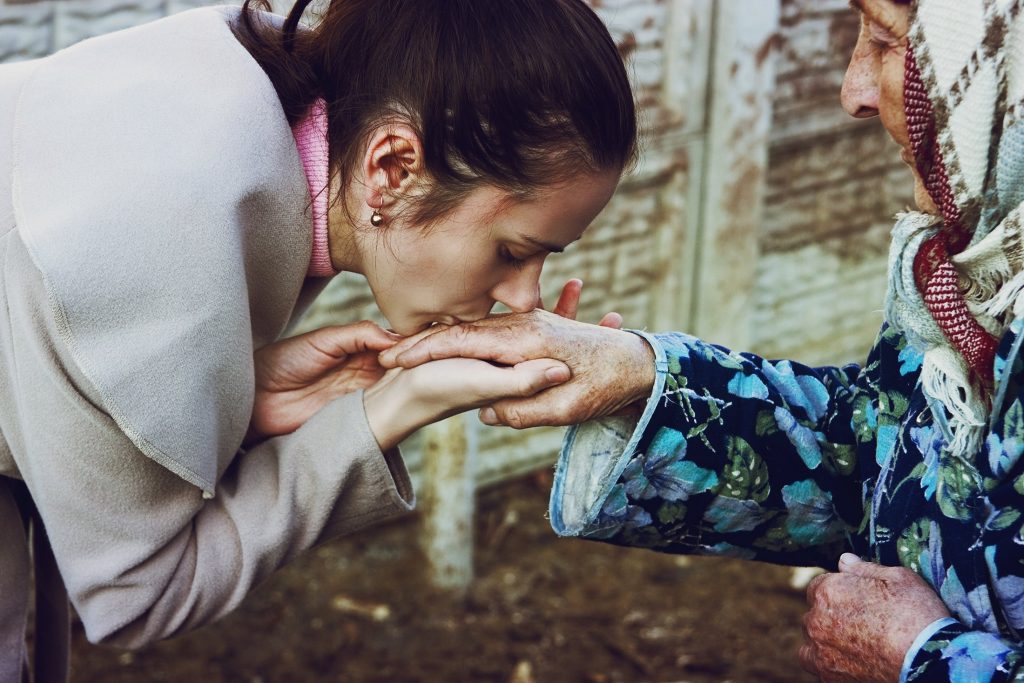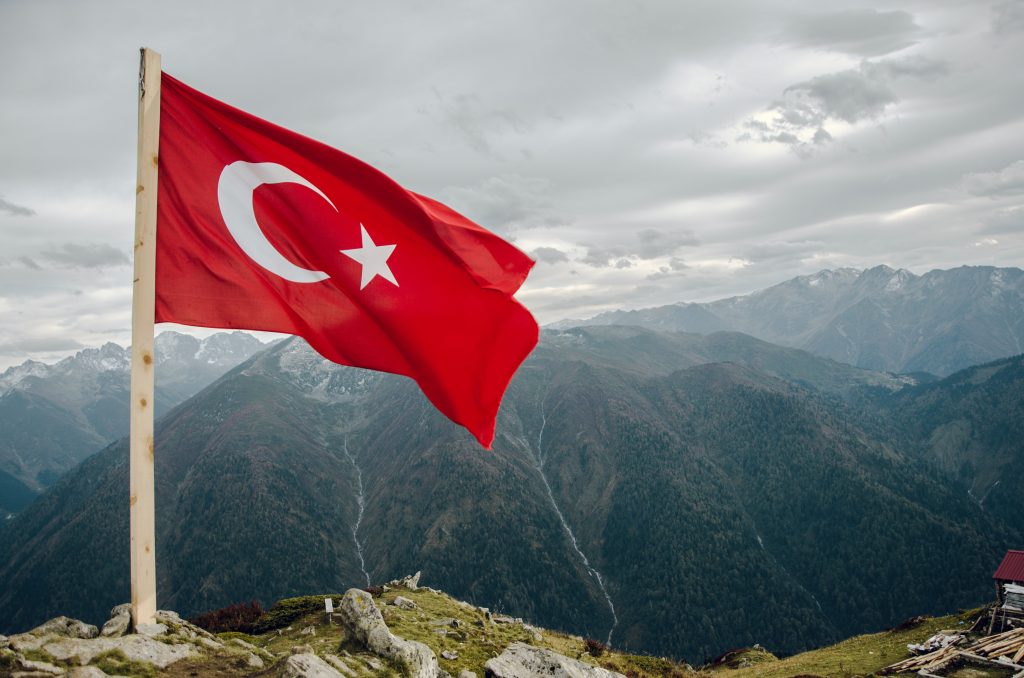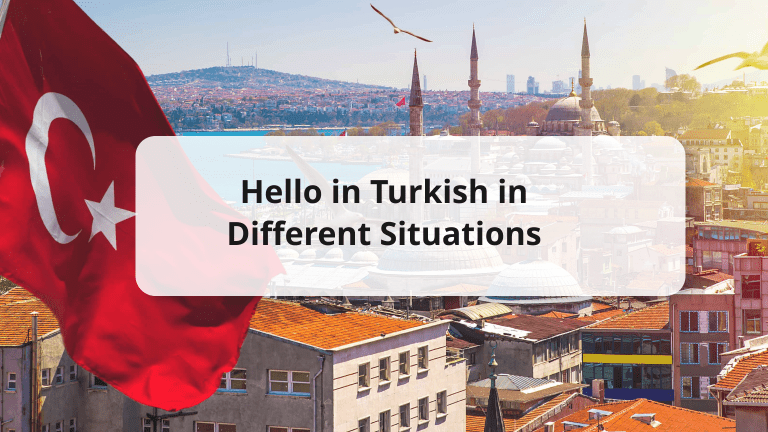When learning the Turkish language or visiting the country, it’s rather important to learn how to say hello in Turkish! Not only will greeting Turks in their own language make the interaction start off on a positive note, these greetings have deep meanings such as good wishes, or showing acknowledgment. Being polite and learning how to say thank you in Turkish are also important.
There are a lot of different Turkish greetings or ways to hello in Turkish depending on the situation you find yourself in. In this article, we will discuss these different greetings with some examples to help you along the way, and give some insight into Turkish greeting etiquette.
How to Say Hello in Turkish
Before you set off on your language learning journey, whether it be a particular topic or perhaps you want to become fluent in a language, remember to first prepare by finding the best way to learn a language. It will make learning from the get-go a bit easier!
Informal Greetings in Turkish
Hello/Hi – Selam
This is the standard way of saying hello in Turkish. It is considered a bit informal, can be translated as “hi” in Turkish and is preferred by younger generations. It means “peace” and is derived from the universal Muslim greeting “Es selam’ün aleyküm”.
Hello – Merhaba
Like, “Selam“, or “Merhaba” is another standard way to say hello in Turkish. This way of greeting is considered to be a lot more formal though. It means “I receive you graciously” or “I welcome you”, but it is basically used as a “Hello”. You can use “Merhabalar” (the plural of Merhaba) when addressing a group of people instead of just using “Merhaba”.
A reply can consist of “Merhaba”, “Sana da merhaba” (Hello to you, too), or the correct time-specific greeting.
Formal Greetings in Turkish
These following greetings and ways to say hello in Turkish should only be used in formal situations to say hello in Turkish. Such as when greeting your co-workers before a meeting. If you are unsure about which greeting to use, be formal. The Turkish are incredibly polite and warm people, but traditional and believe that you should respect women and elders. It’s important to not be disrespectful.
Hello, Madam/Sir – Merhaba efendim
When in a formal setting or when you are not well acquainted with someone, you can add “efendim” before “merhaba” which forms “efendim merhaba” and means “Sir/Madam, hello” or after “merhaba” so it forms “merhaba efendim”; “Hello, Madam/Sir “. “Efendim” is not gender specific and it means sir or madam.
A response to this could be “Tanıştığımıza memnun oldum”, which means “I’m pleased to meet you” or simply “memnun oldum” which means “I’m pleased”.
Time Specific Greetings

Good Morning – Günaydın
A greeting to be used in the mornings. Additionally, you can also say “Sabah şerifleriniz hayrolsun” which means “May your blessed morning be full of goodness” or the shortened version “Hayırlı sabahlar”. These are a more polite and warm way to greet someone in the morning and are favored among traditionalists.
Good Day – İyi günler
A phrase to use during daylight hours. It also means “have a good day” and is considered to be formal and is not really used to greet people that you are well acquainted. It can also be used to say “goodbye”.
Good Afternoon – Tünaydın
A phrase to use during the afternoon. It is rarely used besides greeting new people and poking fun at people who took a nice afternoon nap. Like, if your co-worker fell asleep at their desk, you would use this phrase to wake them up in a teasing manner.
Good Evening – İyi akşamlar
A polite greeting that can be used to greet anyone. Similar to “Günaydin”, you may also say “Akşam şerifleriniz hayrolsun” which means “May your blessed evening be full of goodness” or the shortened version “Hayırlı akşamlar” which means “May your evenings be blessed”.
Good Night – İyi geceler
To be used after the sun has set and there is no sunlight present. You can also use “Hayırlı geceler“ which means “May your nights be blessed”.
How to Answer the Phone

Turkish people don’t greet someone on the phone with “merhaba”, instead they simply say “Alo!” which is pronounced like “Hello” in English. This phrase is also used to grab someone’s attention, like what a teacher would say to grab the attention of their students. Be careful not to be rude with it!
Greetings — Visitors and Co-workers

Welcome
On Familiar Terms – Hoş geldin
This phrase is used to welcome visitors that you are friendly or familiar terms with. This would be your friends or family that could be coming to visit you at your home!
On Formal Terms – Hoş geldiniz
If you are welcoming a group of visitors or visitors that you don’t know very well or are on formal terms with, then you should use this phrase. This would be; your boss visiting your home for dinner, or your friend’s plus one that you have never met before.
A reply (as the guest) to either of these phrases of welcoming would be “hoş bulduk”. This phrase doesn’t have an English equivalent, but it roughly means “we found it well”.
Greeting while Someone is Working – Kolay gelsin!
“Kolay gelsin” means “Hope it will be easy”. You would use this phrase to greet someone that is working, you are basically saying that you hope their work will be easy! You can combine this phrase with others mentioned in the article, such as “İyi akşamlar. Kolay gelsin!” which means “Good afternoon. Hope it will be easy!”.
Islamic Greetings Used in Turkey
Peace be Upon You – Selâmün aleyküm
Religious Turks will commonly greet each other with “Selâmün aleyküm”, or many of its variants. The phrase is an adaptation of the Arabic As-salāmu alaykum. Religious or not, the polite way to reply to this would be ve “aleyküm-selam” (and upon you peace), adapted from Arabic’s wa-alaikum us-salām.
The Greeting Culture of Turkey

Titles in Turkish
When it comes to titles, the Turkish language has a whole boatload of titles for people, especially family members. For now, we will stick to the basics. You could repeat their name when greeting someone such as “Merhaba Deniz Bey” which means “Hello, Mr. Deniz” or “Merhaba Isra Hanım”- “Hello, Ms. Isra”.
This usually follows the formula greeting + name + masculine/feminine title. Alternatively, you could use their surname instead of their name which follows the same principle— greeting + title + surname.
For example “Merhaba, Bay Akbas”, “Hello, Mr. Akbas” or “Merhaba, Bayan Akbas”, “Hello, Ms. Akbas”.
Alternative Greetings in Turkish
You can also greet someone with a slight nod of your head, this means “I acknowledge and salute you” and can also be seen as a sign of respect. Waiving is acceptable, although, when you know someone well it is common to literally greet them with open arms, which references a hug! Lastly, you may greet members of the same gender with a kiss on each cheek or a hug. It’s not widely acceptable to do this with the opposite gender, but it isn’t exactly taboo either.

How to Say Goodbye in Turkish
Saying goodbye is just as important as greeting someone. Let’s go over a few ways to say goodbye in Turkish with some dialogue to make it clear:
Casual
In casual situations, you can use “Hoşça kal” to say goodbye, which means “Stay good” and is the shortened version of “hoşça kalın”. You should only use this to say goodbye to close friends and family. When your friend or whoever you met is the one leaving you, you can say goodbye by saying “Güle güle“ (essentially means “to leave with a smile”).
Example dialogue:
Imagine your friend is visiting you at your home.
Friend: Günaydin! (Good morning!)
You: Hoş geldin! (Welcome!)
Friend: Hoş bulduk (I found it well.)
After hanging out, it’s time for your friend to leave.
Friend: Hoşça kal (Goodbye.)
You: Güle güle! (To leave with a smile.)
Time-Specific Greetings in Turkish
You can use the greetings “İyi günler” (good day) and “İyi geceler” (goodnight) as a way to say goodbye as well. Just use it at the right time!
Example dialogue:
Imagine you go to work for your late shift, where you find your co-worker working hard.
You: Efendim merhaba, Kolay gelsin! (Hello sir/madam, it will be easy!)
Co-worker: İyi günler. (Good day.)
After your shift is over, you decide to say goodbye to your co-worker before leaving
You: Hayırlı geceler! (May your nights be blessed)
Co-worker: İyi geceler. (Goodnight.)
When You are Seeing Them Again Soon
You can use “Görüşmek üzere” (See you soon), “Görüşürüz” (See you), or “Yarın görüşürüz” (See you tomorrow) to say goodbye to someone that you know you will be seeing again.
Example dialogue:
Imagine you are visiting your sibling to brainstorm birthday party ideas for your parent. This is a long process, you know you will see your sibling again the next day. You arrive at their home.
You: Merhaba! (Hello!)
Sibling: hoş geldin. (Welcome.)
After many hours of brainstorming, you two decided to retire for the night and continue planning the next day.
You: Yarın görüşürüz! (See you tomorrow!)
Sibling: Görüşürüz. (See you.)
The Islamic Way to Say Goodbye in Turkish
The phrase used here would be “Allah’a ısmarladık” which aptly means “May Allah keep you safe”.
Example dialogue:
While at a coffee shop, you decided to strike up a conversation with the stranger waiting for their coffee.
Them: Selâmün aleyküm. (Peace be upon you)
You: ve aleykümü’s-selam. (And upon you peace)
After chatting for a bit, the stranger got their coffee and is leaving.
Them: Allah’a ısmarladık (May Allah keep you safe.)
You: Güle güle! (To leave with a smile.)

Salem. This is the standard way of saying hello in Turkish. It is considered informal, can be translated as “hi” in Turkish and is preferred by younger generations to use.
To be used after the sun has set and there is no sunlight present. You can also use “Hayırlı geceler“ which means “May your nights be blessed”.
Hoşça kal! – Stay good!
Learning how to greet and say goodbye in Turkish may seem like an insignificant thing to do but it will positively impact your interactions with the locals and it will show that you truly value people and their culture!
If you struggle with this concept or anything related to the Turkish language, it’s a good idea to get a Turkish tutor at AmazingTalker! You will definitely find a tutor that will satisfy your language learning needs.
Not just the Turkish language though, AmazingTalker has a wide variety of language tutors that can expertly help you reach your language fluency goals. All this and so much more at AmazingTalker!


















